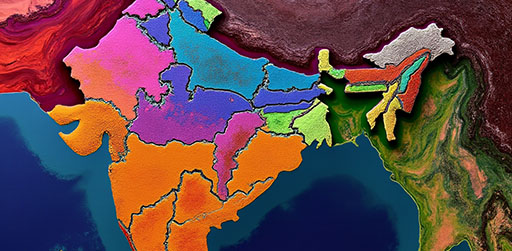Impact on Geospatial Data
- Discover how India’s Digital Personal Data Protection Act (DPDPA) affects geospatial data collection.
- Understand the challenges and implications for industries relying on map data.
- Learn how Incognito Browser can help you maintain your privacy in an increasingly monitored world.
India’s Geospatial Data Revolution
Geospatial data, commonly known as map data, has become indispensable in modern economies. From infrastructure and mining to consumer-facing services like mobility, fitness, and last-mile delivery, accurate and extensive map data is crucial.
Recognizing its importance, the Indian Government significantly liberalized the collection and use of map data through guidelines issued in 2021. In 2022, further clarifications were provided by the Department of Science and Technology through an office memorandum.
Geospatial data can be collected through various means, including satellite imagery, vehicle-mounted sensors, mobile applications, and drones.
However, these activities often capture a wealth of personal data—faces, physical features, location data, biometric information, and even audio. This raises significant privacy concerns, especially when individuals are unaware that their data is being collected.
The Advent of DPDPA
India’s Digital Personal Data Protection Act (DPDPA) of 2023 marks a significant milestone in the country’s data protection landscape.
While not yet enforced at the time of writing, it is expected to come into effect soon.
The DPDPA introduces comprehensive regulations for data protection, emphasizing the need for consent before collecting and processing personal data.
Under the DPDPA, consent from the data principal (the individual whose data is being collected) is mandatory, with limited exceptions for legal obligations, court orders, medical emergencies, and other specific scenarios. For commercial geospatial data collection, these exceptions are unlikely to apply, meaning that consent and notice requirements will be crucial.
Why Privacy Matters More Than Ever
Big tech companies have a history of collecting and monetizing user data. While they claim to take measures to protect this information, it’s hard to overlook past incidents where user data was compromised.
The Case for Incognito Browser
This is where using a private browser like Incognito Browser can make a significant difference. Unlike traditional browsers that track your every move, Incognito Browser offers enhanced privacy features that help keep your online activities confidential.
Whether you’re browsing on an Android device or any other platform, using a private browser can give you peace of mind knowing that your data isn’t being harvested for profit.
Personal Experience with Privacy Tools
As someone who values privacy, I’ve found that using tools like Incognito Browser significantly enhances my online experience.
The app’s robust features ensure that my browsing history remains private, preventing third parties from tracking my activities.
This level of control is particularly important given the increasing surveillance measures implemented by governments worldwide.
Challenges in Compliance
Even well-intentioned data collectors face significant challenges under the DPDPA. For example, if a vehicle captures street images in public spaces and incidentally photographs individuals’ faces, it technically needs to notify each person about the data collection purpose and obtain their consent. This becomes even more complex when dealing with children’s data or individuals with disabilities, requiring verifiable consent from parents or guardians.
On a large scale, complying with these consent and notice requirements becomes nearly impossible. A practical solution could involve technical measures such as blurring identifiable features during data collection. Equipment manufacturers might need to incorporate such features into their products to meet market demands and legal compliance.
Legal Principles and Privacy Expectations
Another potential solution lies in evolving legal principles like the “reasonable expectation of privacy.”
This principle suggests that capturing information about individuals in public spaces without their explicit consent might be permissible if they have no reasonable expectation of privacy in those settings.
While not explicitly included in the DPDPA, this principle could play a role in shaping future interpretations of the law.
However, extending this argument could lead to unintended consequences. If stepping into a public place means making one’s face available for processing without consent, it could open the door for entities to freely capture and use such data.
International Implications
The DPDPA also has implications for foreign entities involved in geospatial data collection in India. These entities must comply with Indian laws and may face restrictions on transferring personal data to certain jurisdictions. Additionally, geospatial laws impose soft data localization requirements that must be considered alongside the DPDPA’s consent requirements.
In summary, India’s new privacy law introduces significant challenges for geospatial data processing activities.
While technical solutions like blurring identifiable features offer some relief, a broader rethinking of legal principles may also be necessary. As we navigate this complex landscape, it’s crucial to stay informed and take proactive steps to protect our privacy.
By using tools like Incognito Browser, we can ensure that our online activities remain confidential and secure.
By understanding the broader implications of such developments and taking steps to safeguard our privacy, we can enjoy the benefits of technological advancements without compromising our personal information.



